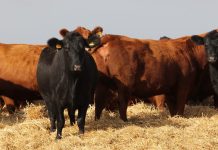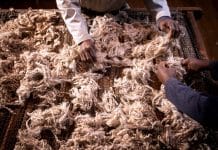Stockfarm visited Avondale Farm in the Queenstown district where Simon Sutton, one of four brothers, farms by mimicking the way wild animals used to roam unrestricted before fences were erected.
Following in his late father and grandfather’s footsteps, Simon took over the reins at Avondale in 2011. “My father and grandfather both ran a dairy on the farm and in the later years Dad also crossbred some Beefmaster bulls with his Brangus-cross cows. He wanted to capitalise on meat quality and cattle that would do better in our rugged conditions.”
After much consideration and taking the shortage of water in the area into account, Simon discontinued the dairy and shifted his attention to a Beefmaster-cross enterprise.
A more natural way of farming
During the drought it was challenging to feed the animals on the veld, even after reducing their numbers. At the same time, Simon’s brother Gary, who farms game on the Imvani River, struggled to generate the income he needed. Having completed a course at the Savory Institute, he suggested to Simon that they should consider a different and more natural approach to farming.
To learn more about the Savory viewpoint on regenerative farming, follow this link.
Simon says they have made a paradigm shift over the last three years to a more holistic approach. “Wild animals used to move unrestricted while searching for new pastures, which gave the veld enough time to recover. This is the crux of what we are trying to achieve – improving our veld by using the right type of animals to benefit from the amount of grass on the farm.”
The Sutton brothers, especially Gary, have a passion for dung beetles. The beetles basically take the dung, which often contains parasite eggs, deep into the soil where it can end the life cycle of worms.
“We all know that ivermectin treats many types of parasite infestations. However, a dung beetle will not go near the dung of an animal treated with it,” Simon explains. “We have been trying to drastically reduce dipping our animals, even though this a redwater haven. The cows have thus started to build up immunity against the ticks.” Since January, Simon has spot-injected only half of the cows in the herd.

The road is a wee bit longer
Although not yet farming 100% holistically, Simon remarks on the advantages of the endeavour, such as new varieties of grass emerging seemingly from out of nowhere. “It emphasises the fact that we are on the right track by bunching cattle together in smaller camps where the grass is eaten quickly and given a chance to recover and grow naturally. Similarly, and although it takes a wee bit longer to achieve the desired results, we are training the game to follow the cattle and mimic their movements.”
Their biggest challenge to date has been changing the methods of farming. “Staying abreast of the latest technology and developments, one has to get over the mindset of not being able to do it any other way. We are reverting to a mindset from many years ago, when the stampede type of grazing flattened the grass that does not get eaten and which becomes the food for the following year’s growth. One can even view the latter as next year’s fertiliser.”

A work in progress
In Simon’s experience, farming in harmony with nature is a slow but rewarding transformation. Approximately 70% of Avondale has been subdivided into small camps, while the rest of it will be converted when it is financially viable, and once some water issues have been dealt with.
“We are managing our veld using cattle to turn grass into beef. At the end of the day, we produce a maximum amount of meat from our veld, so the hoof action digging up the ground and loosening the soil, is what we are looking for – not the number of mouths feeding from the veld – to regenerate the veld.”
Non-selective grazing
They try to incorporate non-selective grazing by not giving the animals the option of choosing the best grass to eat. “One will typically have a small camp with a lot of animals in it, eating what is in front of them. My goal is to get up to 220 cows in a 15ha camp, and then moving them to the next camp after three to four days. This will more than double the number of cows my father thought possible.”
Apart from the beneficial stampeding effect, the amount of urine and manure that is introduced to each camp also increases the benefit. The 40mm underground piping that Simon has implemented supplies many of the camps with fresh, clean water for which the animals have a preference. “The reason why excreted urine plays such a huge role,” he says, “is that in summer a cow will normally drink roughly 70ℓ of water a day.
“Approximately 20 to 30% is urinated into the ground, adding extra moisture to it. That is why one often sees green grass growing in the winter months. Like the different types of grass re-establishing themselves, these are the type of benefits we are reaping.”

Important selection criterion
According to Simon, the type of cow within a breed, and not a specific breed, will determine success. He notes that when they select their bulls, they usually go for an animal with a slightly smaller frame. “The reason is not because we want smaller weaners, but to get more beef in total. For example, if we run 300 cows with a 90% conception rate, we can get 270 calves weighing 200kgs, compared to 200 bigger framed animals giving you 180 calves weighing 250kgs. The difference is 9 000kgs.”
When asked for some advice and encouragement, Simon says: “Do not be afraid to change your farming setup. Financially change can be difficult, but there are ways to make gradual changes that will not be a financial burden. In the end you will experience financial gain and preserve your veld. We have gradually changed our farming methods over the past three years and are already reaping significant benefits.” – Carin Venter, Stockfarm
For more information, contact Simon Sutton on 072 492 9564 or send an email to bonavon@eci.co.za.








